Michelle Cooper's Blog, page 14
February 11, 2017
‘Indonesia Etc: Exploring the Improbable Nation’ by Elizabeth Pisani
This is a fascinating book about a year spent travelling around the Indonesian archipelago, written by a multilingual British woman who has spent much of her adult life in this diverse nation. She began her career as a journalist, then became an epidemiologist employed by the Indonesian Ministry of Health. In 2011, she decided to take time off to travel and learn more:
“I only had one rule: ‘Just say yes’. Because Indonesians are among the most hospitable people on earth, this made for a lot of yesses. Tea with the Sultan? Lovely! Join a wedding procession? Yes please! Visit a leper colony? Of course! Sleep under a tree with a family of nomads? Why not? Dog for dinner? Uuuuh, sure. This policy took me to islands I had never heard of. I was welcomed into the homes of farmers and priests, policemen and fishermen, teachers, bus drivers, soldiers, nurses. I travelled mostly on boats and rickety-but-lurid buses that blared Indo-pop and had sick-bags swinging from the ceiling. Sometimes, though, I lucked into a chartered plane or rode cocooned in a leather car-seat behind tinted glass. I can count on one hand the number of times I was treated with anything other than kindness. I can also count on one hand the number of days that I did not have a conversation about corruption, incompetence, injustice and the slings and arrows of outrageous fortune.”
This is saved from being one of those ‘patronising white person blogging about their year of backpacking though a developing nation’ books by the author’s wide-ranging and first-hand knowledge of Indonesia. She displays genuine curiosity and warmth as she visits each community, but she’s also able to draw on her previous experiences. For example, there’s an excellent chapter on Aceh, the province that’s been wracked with separatist violence for decades. She provides a good summary of its complex post-colonial history, explaining why Aceh’s separatist movement is completely different to those in East Timor and West Papua, but she also relates anecdotes from working as a journalist in Aceh in the 1990s:
“At the time, it was impossible to tell who was behind the attacks. Only once, we saw a letter addressed to Indonesian newspaper editors, claiming responsibility for this wave of raids. Written entirely in lower-case, the letter was an eccentrically spelled mish-mash of anti-Javanese invective, childish threats, wounded pride and separatist rhetoric […] People called the troublemakers the GPK, just as the government did, and they had many theories about who they were. Most involved some combination of the following: disgruntled former soldiers who had been fired in a short-lived campaign against corruption in the military; thugs who wanted a bigger share of the marijuana trade (saus ganja was once a common ingredient in the cuisine of the region, and Aceh remained a centre of production for the crop); hot-blooded separatists back from training in Libya. It seemed wildly improbable to me that an organisation that didn’t have a shift key on its typewriter and couldn’t spell its own name would be linked to international terror training networks; it was only years later that I found that some of the fighters were indeed graduates from Middle Eastern training camps, though all the other theories also proved to be true.”
Much of the conflict in Indonesia that’s reported in the Australian media as being due to ‘the rise of Islam’ turns out to have a more complex, but also more prosaic, explanation. For example, the gangs of leather-jacketed, motorbike-riding thugs previously employed by politicians in Jakarta to attack student demonstrators have now
“begun to appear in turbans or knitted skullcaps, long white robes and straggly beards [to] selectively smash up those bars, nightclubs and brothels that don’t pay them protection money. A friend in the music business told me they demonstrated against Lady Gaga only after her promoters refused to pay them to provide security for her concert. But they do not choose their targets indiscriminately. They never vent their wrath on the porn industry, for example, because it is said to be controlled by the military.”
Most of the book, though, is not explicitly about politics but about the lives of ordinary Indonesians, trying to earn enough money to raise their families while dealing with a corrupt and incompetent bureaucracy, but also doing what people all over the world do – attending school, playing games, visiting friends, celebrating birthdays and weddings, and, even in the remotest islands, Facebooking on their mobile phones. It’s all related in a warm, entertaining style by an intrepid traveller. I think even readers who aren’t much interested in Indonesia will enjoy this book.
January 31, 2017
When People Declare That Historical Novels Are Neither Interesting Nor Relevant To Modern Life …
… I think of Winston Churchill after the war:
Churchill worried not so much that those who forget the past are condemned to relive it, but that the loss of the past would mean ‘the most thoughtless of ages. Every day headlines and short views.’
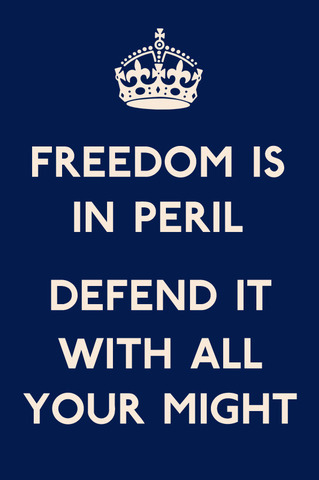
When (Some) People Declare That Historical Novels Are Neither Interesting Nor Relevant To Modern Life …
… I think of Winston Churchill after the war:
Churchill worried not so much that those who forget the past are condemned to relive it, but that the loss of the past would mean ‘the most thoughtless of ages. Every day headlines and short views.’

January 22, 2017
‘The Book That Made Me’, edited by Judith Ridge
Disclaimer: I’m acquainted with several of the people involved with the creation of this book. But I wouldn’t be writing about it here if I didn’t like it – I’d just pretend I hadn’t read it.
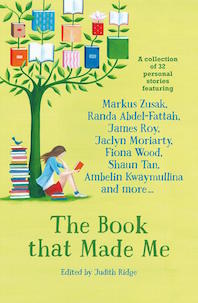 The Book That Made Me is an interesting collection of personal stories by thirty-one authors and artists (mostly Australian, mostly writers for children and teenagers) about the books that “made them” – made them think, feel, laugh, made them want to create their own books. As with most anthologies, there’s a wide variety of pieces and I found some more compelling than others. Shaun Tan contributes a thoughtful essay about books that disturbed him, starting at the age of seven or eight with his mother reading him Animal Farm as a bedtime story, under the mistaken impression that it would be a charming fairytale (he decided it was “no more disturbing than stuff I witnessed at school each day”). His charming, whimsical illustrations can also be found throughout the book.
The Book That Made Me is an interesting collection of personal stories by thirty-one authors and artists (mostly Australian, mostly writers for children and teenagers) about the books that “made them” – made them think, feel, laugh, made them want to create their own books. As with most anthologies, there’s a wide variety of pieces and I found some more compelling than others. Shaun Tan contributes a thoughtful essay about books that disturbed him, starting at the age of seven or eight with his mother reading him Animal Farm as a bedtime story, under the mistaken impression that it would be a charming fairytale (he decided it was “no more disturbing than stuff I witnessed at school each day”). His charming, whimsical illustrations can also be found throughout the book.
Other favourite pieces were those which had something in common with my own experiences. Simmone Howell writes about how she tried (and failed) to become a proper teenager using the wisdom contained in the Sweet Dreams and Sweet Valley High series. Catherine Johnson explains how she “never expected to see [herself] in a book … everyone back then knew only white people lived in books and had adventures”. Jaclyn Moriarty discovered, aged six, how her secret rage at the injustices of life had been transformed into a book called The Magic Finger. I also enjoyed Fiona Wood’s discussion of the helpful life lessons contained in Anne of Green Gables; Emily Maguire’s description of how Edith in Grand Days encouraged her to take risks and celebrate her teenage mistakes; and Julia Lawrinson’s entertaining account of her obsessive identification with Laura Ingalls Wilder. Most of these writers were already familiar to me, but I’d never heard of Catherine Johnson and now I feel a pressing need to read some of her children’s books, in which she says she “made sure to put children like me [that is, mixed-race kids] right in there, riding horses, wearing those amazing frocks, and mostly having adventures, just like everyone else.”
There was plenty of book nostalgia for me to wallow in (Dr Seuss! Little Women! Trixie Belden!) and I’ve added some recommended books to my To Read list, including Tom’s Midnight Garden by Phillipa Pearce, The House on Mango Street by Sandra Cisneros and Displaced Person by Lee Harding. This book contains potted biographies of all the contributors and I was pleased to see a thorough index. The Book That Made Me is published in Australia by Walker Books and will be published in North America this year by Candlewick Press, with all royalties going to the Indigenous Literacy Foundation.
January 14, 2017
‘Mad World: Evelyn Waugh and the Secrets of Brideshead’ by Paula Byrne
I really enjoyed Mad World by Paula Byrne, which is an engrossing account of the people who inspired Evelyn Waugh’s novels – specifically, the troubled Lygon family of Madresfield Court, so similar to the Flyte family in Brideshead Revisited.
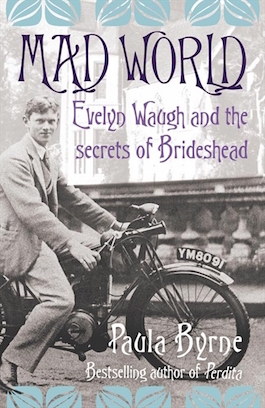 The true story of the Lygons turns out to be even more dramatic and tragic than that of their fictional counterparts. Lord Beauchamp, a very grand earl, didn’t merely choose to live away from England with his lover because he disliked his pious wife – he was forced into permanent exile in 1931 to evade arrest for “committing acts of gross homosexual indecency” with his servants. While aristocratic men of the time often got away with flouting this law, Lord Beauchamp had been flagrant in his disregard for social and legal conventions. This became a problem when it appeared one of his daughters, Lady Mary, might marry Prince George. The King took action and recruited Beauchamp’s brother-in-law, Bendor, the Duke of Westminster, who’d long resented Beauchamp:
The true story of the Lygons turns out to be even more dramatic and tragic than that of their fictional counterparts. Lord Beauchamp, a very grand earl, didn’t merely choose to live away from England with his lover because he disliked his pious wife – he was forced into permanent exile in 1931 to evade arrest for “committing acts of gross homosexual indecency” with his servants. While aristocratic men of the time often got away with flouting this law, Lord Beauchamp had been flagrant in his disregard for social and legal conventions. This became a problem when it appeared one of his daughters, Lady Mary, might marry Prince George. The King took action and recruited Beauchamp’s brother-in-law, Bendor, the Duke of Westminster, who’d long resented Beauchamp:
“It seemed grotesquely unfair that his brother-in-law should have three sons, a loyal wife, a string of homosexual lovers, a glittering career and great standing in politics, while he himself had got through three wives without producing a single male heir … Bendor set about his task with great relish and ruthless dispatch.”
The Lygon family was torn apart, with most of the children taking their father’s side and refusing to forgive their mother for divorcing him. The girls, previously the most eligible debutantes of their time, were unable to make ‘good’ marriages, due to the scandal. Lady Mary, the most beautiful, eventually married a philandering Russian aristocrat, who left her penniless and battling mental illness, alcoholism and loneliness. The heir, Lord Elmsley, married a much older woman and had no children; Lord Hugh, the model for Sebastian Flyte, quickly lost his good looks and his money and spent the remainder of his short life in a drunken stupor, trying to block out the guilt and shame of his own homosexuality; only Lady Dorothy, portrayed as Cordelia Flyte, seemed to live a relatively happy and productive life, although she had her own brief and disastrous marriage.
The author says that she wrote this book because she believed “that Evelyn Waugh had been persistently misrepresented as a snob and a curmudgeonly misanthropist.” However, I finished this book disliking Waugh, as a person, even more than I already had, which I didn’t think was possible. He was a snob. He spent his life attaching himself to a series of rich, aristocratic families, happy to be their court jester if he got to stay in grand country houses for extended periods at their expense, especially if it also provided him with good writing fodder. From his earliest years, he was spiteful and nasty, bullying anyone he regarded as his inferior in either social status or intelligence. He may have possessed wit and humour, but it always had a sharp edge. There is a lot of description of his idiotic drunken escapades with friends, which we are meant to admire:
“…to an outsider, the banter and play that characterised Mad World [that is, life at Madresfield Court with the Lygon siblings] appear frivoulous and jejune, but in reality the comedy was a means of survival and a manifestation of love.”
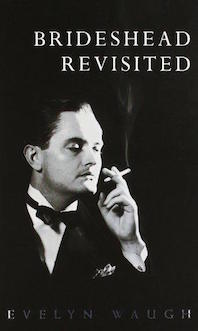 Hmm. Waugh at least had some self-awareness and admitted, when proposing to the woman who would become his second wife, “I am restless and moody and misanthropic and lazy and have no money…” (It reminded me of Mr Mybug in Cold Comfort Farm trying to appear more interesting to Flora by hinting at his dark depths.) Perhaps the poor woman thought he was joking, but she agreed to marry him and then spent years living in the country, perpetually pregnant, looking after their huge brood of children while he caroused around London. Despite his fervent Roman Catholicism, he had no moral qualms about buying the services of prostitutes, including “little Arab girls of fifteen and sixteen, for ten francs each” in Morocco. Even his brief military service during the war was marked by impropriety, when he falsified the official record of his battalion’s withdrawal from Crete in 1941. He told his friend Nancy Mitford that his behaviour would have been even worse if he hadn’t been under the moral influence of the Church. The mind boggles.
Hmm. Waugh at least had some self-awareness and admitted, when proposing to the woman who would become his second wife, “I am restless and moody and misanthropic and lazy and have no money…” (It reminded me of Mr Mybug in Cold Comfort Farm trying to appear more interesting to Flora by hinting at his dark depths.) Perhaps the poor woman thought he was joking, but she agreed to marry him and then spent years living in the country, perpetually pregnant, looking after their huge brood of children while he caroused around London. Despite his fervent Roman Catholicism, he had no moral qualms about buying the services of prostitutes, including “little Arab girls of fifteen and sixteen, for ten francs each” in Morocco. Even his brief military service during the war was marked by impropriety, when he falsified the official record of his battalion’s withdrawal from Crete in 1941. He told his friend Nancy Mitford that his behaviour would have been even worse if he hadn’t been under the moral influence of the Church. The mind boggles.
Paula Byrne provides an interesting analysis of most of Waugh’s books, including Vile Bodies, A Handful of Dust and the Sword of Honour trilogy, but I found her detailed chapter on Brideshead Revisited the most fascinating. She examines his descriptions of Oxford, homosexuality, Roman Catholicism and aristocratic life, linking the major characters in the novel to their real-life counterparts. I think readers who love Waugh’s writing will find this book rewarding – but don’t expect to feel very fond of Waugh by the end of it.
December 23, 2016
My Favourite Books of 2016
It’s not quite the end of the year, but here are the books I’ve read in 2016 (so far) that I loved the most. But first, some statistics.
I only read 46 new books this year, fewer than I usually read. This was partly because I was studying for most of the year, plus I’d started a new job, both of which took up lots of mental energy. I also read a great deal of (mostly depressing) political news in newspapers, magazines and blogs. So when I wasn’t doing that, I escaped into the comfort of old favourites from my bookshelves, including a dozen of Ruth Prawer Jhabvala’s books and a re-read of all the Rivers of London novels in preparation for the release of Book Six in that series.
So, what type of new books did I read this year?
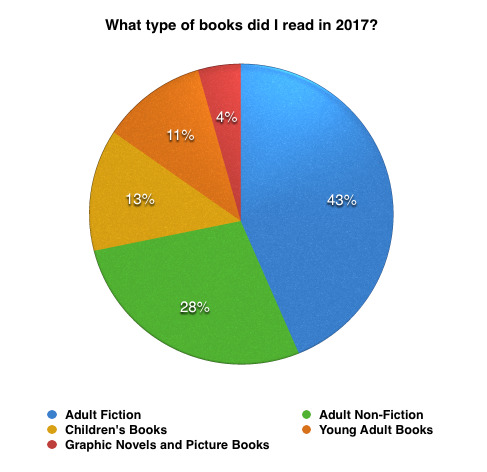
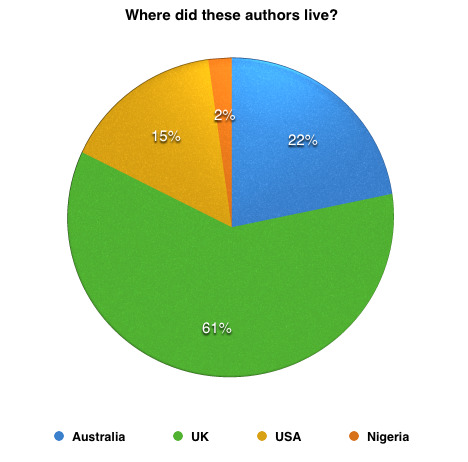
It was the year of British literature, it seems.
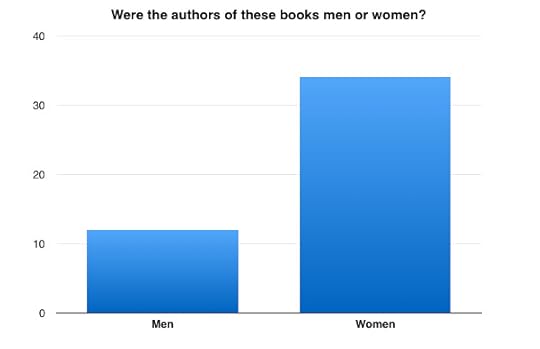
And women writers dominate, yet again.
Now for my favourites.
My Favourite Adult Fiction
My favourite novels this year included Breakfast with the Nikolides by Rumer Godden, Olive Kitteridge by Elizabeth Strout, Slade House by David Mitchell and the latest installment of the Rivers of London series, The Hanging Tree by Ben Aaaronovitch.
My Favourite Non-Fiction
It was non-fiction that really captured my interest this year. Favourites included The Genius of Birds by Jennifer Ackerman, Bird By Bird: Some Instructions on Writing and Life by Anne Lamott, Party Animals: My Family and Other Communists by David Aaronovitch, and two of Bill Bryson’s books, At Home: A Short History of Private Life and The Road to Little Dribbling. I’m only halfway through Stalin Ate My Homework by Alexei Sayle, but I’m really enjoying it so far. However, my absolute favourite of the year was Cordelia Fine’s Delusions of Gender, a brilliantly incisive yet accessible discussion of neurocognitive research into sex differences, which I realise I didn’t actually review on this blog because I was busy writing assignments at the time. I will try to remedy that at some stage in the near future, but in the meantime, here’s a good review.
My Favourite Books for Children and Teenagers
I loved Iris and the Tiger by Leanne Hall and Howl’s Moving Castle by Diana Wynne Jones. I was also beguiled by the first book in Antonia Forest’s Marlow series, Autumn Term.
My Favourite Picture Books and Graphic Novels
I was entertained (and occasionally enraged) by a collection of First Dog on the Moon’s political cartoons, A Treasury of Cartoons. I also enjoyed Night Witch, a graphic novel in the Rivers of London series, by Ben Aaronovitch, Andrew Cartmel, Lee Sullivan and others (although it wasn’t as good as the prose novels).
Thank you to everyone who contributed to Memoranda in 2016. I hope you’ve all had a good reading year and that 2017 brings you lots of inspiring, informative and entertaining books. Happy holidays!
December 22, 2016
‘Olive Kitteridge’ by Elizabeth Strout
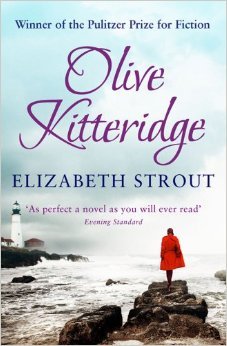 I’ve been engrossed in this collection of short stories, most of them set in a small coastal town in Maine and all connected in some way to the central character, Olive Kitteridge. Olive, a retired high-school teacher, is fascinatingly awful – irritable, moody, impatient and highly critical of just about everyone she knows, including her sweet, long-suffering husband, Henry. Olive is an intelligent and perceptive woman and she can be compassionate to those in need of comfort – a suicidal former student, a young stranger with anorexia, a newcomer to town who’s recently bereaved. However, she’s also tragically incapable of seeing her own flaws and is baffled when her son chooses to move to the other side of the continent to get away from her. There’s some beautiful descriptive writing and lots of thoughtful commentary on the complex ways people behave and relate to one another. I must admit it does get a bit grim, what with all the characters being cheated on and abandoned and wanting to kill themselves, but it does end with a suggestion of hope, with Olive musing:
I’ve been engrossed in this collection of short stories, most of them set in a small coastal town in Maine and all connected in some way to the central character, Olive Kitteridge. Olive, a retired high-school teacher, is fascinatingly awful – irritable, moody, impatient and highly critical of just about everyone she knows, including her sweet, long-suffering husband, Henry. Olive is an intelligent and perceptive woman and she can be compassionate to those in need of comfort – a suicidal former student, a young stranger with anorexia, a newcomer to town who’s recently bereaved. However, she’s also tragically incapable of seeing her own flaws and is baffled when her son chooses to move to the other side of the continent to get away from her. There’s some beautiful descriptive writing and lots of thoughtful commentary on the complex ways people behave and relate to one another. I must admit it does get a bit grim, what with all the characters being cheated on and abandoned and wanting to kill themselves, but it does end with a suggestion of hope, with Olive musing:
“… if love was available, one chose it, or didn’t choose it. And if her platter had been full with the goodness of Henry and she had found it burdensome, had flicked it off crumbs at a time, it was because she had not known what one should know: that day after day was unconsciously squandered
[…]
Her eyes were closed, and throughout her tired self swept waves of gratitude – and regret. She pictured the sunny room, the sun-washed wall, the bayberry outside. It baffled her, the world. She did not want to leave it yet.”
Recommended for those who like the short stories of Alice Munro and Margaret Atwood.
December 15, 2016
Miscellaneous Memoranda
– John Banville provoked a lot of responses, most of them derisive, when he said in an interview about his new memoir, ‘I was not a good father. I don’t think any writer is.’ As Joanne Harris said, ‘Not only is Banville’s claim ludicrous, it reinforces the myth that women can’t be Proper Writers because of all the Caring they have to do.’ I especially liked Julian Gough’s response in The Irish Times, which discusses the ‘historical cultural catastrophe’ that bent many Irish men ‘brutally out of shape’ but expresses hope about the new generation of male writers.
– I also enjoyed this article by Matthew Gallaway, in which six writers discuss book covers and blurbs in an very entertaining fashion, and this short piece by Christie Nieman on the joys of ‘quiet’ Young Adult novels.
– In more depressing news, Stealing Books in the Age of Self-Publishing explains that “in the world of self-publishing, where anyone can put a document on Amazon and call it a book, many writers are seeing their work being appropriated without their permission”, with enterprising plagiarists getting rich and escaping punishment. And even if you don’t get plagiarised, there are plenty of other “spiky little soul-destroying aspects of the business” of literature, says Krissy Kneen, who is suffering from Mid-Career Malaise.
– This is probably an appropriate place to quote NOT A WOLF, who is definitely not a wolf pretending to be a man:

– However, there are hopes that the new Australian Senate will refuse to pass the government’s proposed legislation to abolish territorial copyright.
– And if you’re in a French railway station, you now have easy access to stories via vending machines that ‘dispense short stories printed on paper — for free — with passengers able to choose a story of either one, three or five “minutes” in length’.
(Finally, a request aimed at any Australian YA people who might be reading this: if you’re in contact with Judith Ridge, could you please ask her to email me when she has time? I haven’t had any success with the email address I have for her, which is the same as the one listed on her blog, and I’d like to ask her something. Thank you!)
November 19, 2016
What I’ve Been Reading
There are times – for instance, when the world appears to be heading to hell in a handbasket – when even the most politically engaged, newspaper-addicted reader needs to escape into some frothy fiction. And fortunately for me, two of my favourite writers happened to have new novels out.
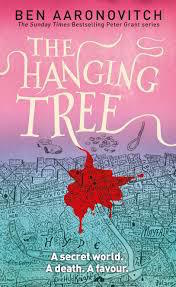 The Hanging Tree by Ben Aaronovitch was a very satisfying new installment of the Rivers of London series. It was good to see Peter back in London where he belongs, solving crimes, making new enemies and nearly getting killed in various dramatic and supernatural ways. He’s assisted by all the old crowd – Stephanopoulos, Guleed the Somali Muslim Ninja, the Rivers, Dr Walid, Kimberley the FBI agent – and it’s nice to see the subtle development of his relationship with his boss, Nightingale (who is actually observed smiling, and at one point, even winking, at Peter in this book). There’s also not one, but two new groups of magicians introduced, who may or may not be Peter’s allies, and there are important revelations about the Faceless Man and Lesley. With the author juggling so many characters and subplots, it’s not surprising that he occasionally drops one, kicks it under the sofa and pretends it never existed. What, for example, has happened to Abigail? But Peter’s narration is so entertaining and the action is so exciting that I honestly didn’t mind the odd plot hole – and in fairness to the author, he does tend to address these sorts of issues eventually, even if it does take a few books before you find out who, exactly, that strange fox-obsessed guy is, or what’s happened to the Quiet People. I also really enjoy the bits where the author goes off on tangents that have absolutely nothing to do with the story – for example, there’s a hilarious scene where he pokes fun at the sort of pompous old white men who keep getting short-listed for the Booker Prize, which makes me wonder whether Ben Aaronovitch ever had an unpleasant encounter with, say, Martin Amis at the BBC one day (although really, the fictional novelist could be based on any number of British male writers). Anyway, The Hanging Tree was well worth the wait and I think I might need to check out the Rivers of London graphic novels while I’m waiting for the next book.
The Hanging Tree by Ben Aaronovitch was a very satisfying new installment of the Rivers of London series. It was good to see Peter back in London where he belongs, solving crimes, making new enemies and nearly getting killed in various dramatic and supernatural ways. He’s assisted by all the old crowd – Stephanopoulos, Guleed the Somali Muslim Ninja, the Rivers, Dr Walid, Kimberley the FBI agent – and it’s nice to see the subtle development of his relationship with his boss, Nightingale (who is actually observed smiling, and at one point, even winking, at Peter in this book). There’s also not one, but two new groups of magicians introduced, who may or may not be Peter’s allies, and there are important revelations about the Faceless Man and Lesley. With the author juggling so many characters and subplots, it’s not surprising that he occasionally drops one, kicks it under the sofa and pretends it never existed. What, for example, has happened to Abigail? But Peter’s narration is so entertaining and the action is so exciting that I honestly didn’t mind the odd plot hole – and in fairness to the author, he does tend to address these sorts of issues eventually, even if it does take a few books before you find out who, exactly, that strange fox-obsessed guy is, or what’s happened to the Quiet People. I also really enjoy the bits where the author goes off on tangents that have absolutely nothing to do with the story – for example, there’s a hilarious scene where he pokes fun at the sort of pompous old white men who keep getting short-listed for the Booker Prize, which makes me wonder whether Ben Aaronovitch ever had an unpleasant encounter with, say, Martin Amis at the BBC one day (although really, the fictional novelist could be based on any number of British male writers). Anyway, The Hanging Tree was well worth the wait and I think I might need to check out the Rivers of London graphic novels while I’m waiting for the next book.
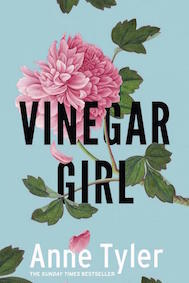 Anne Tyler also has a new book out, this one a modern retelling of The Taming of the Shrew. It’s part of a series commissioned by The Hogarth Press, with Jeanette Winterson doing The Winter’s Tale, Margaret Atwood The Tempest, Howard Jacobson The Merchant of Venice and so on. Now, I really, really hate The Taming of the Shrew, but I figured if anyone could find some charm and humour in the story, it would be Anne Tyler and indeed, I did enjoy a number of scenes, particularly the ones in which Kate, in this version a preschool assistant, interacts with her four-year-old students. The problem is trying to make modern-day Kate’s situation plausible, while staying true to the events of the play. Tyler decides to make Kate the intelligent, strong-minded 29-year-old daughter of an eccentric Baltimore scientist, Dr Battista. His brilliant Russian assistant’s visa is about to expire, so Dr Battista starts a “touchingly ludicrous” campaign for Kate to marry the young man, enabling Pyotr to qualify for a Green Card. This makes no sense whatsoever. If Kate is so smart and stubborn and independent, why is she still living at home acting as an unpaid servant for her selfish father and younger sister, and working in a dead-end child-care job she dislikes? Why does she have no friends and why has she never had a boyfriend (or girlfriend)? She’s not even particularly shrewish, just a bit tactless. If she wants to improve her life, which she does, there are dozens of ways to accomplish this without having to marry a man she barely knows, and who rapidly reveals himself to be a sexist jerk with no social skills. All the characters are paper-thin, but I kept reading, mildly engaged with the story, until the climactic scene in which Kate gives a speech that nearly made me throw the book across the room. Hey, did you know that it’s totally fine for men to be verbally and physically abusive, because “it’s hard being a man”? They just get frustrated because they have to be in charge of everything and have all the power and success in society! They just don’t get enough practice expressing their feelings and their “interpersonal whatchamacallit”! Then Kate and Pyotr live happily ever after, the end. So if you haven’t read any Anne Tyler before, please don’t start with this book. I don’t know what she was thinking. Unless she thought a vile misogynist was about to become President of her country…
Anne Tyler also has a new book out, this one a modern retelling of The Taming of the Shrew. It’s part of a series commissioned by The Hogarth Press, with Jeanette Winterson doing The Winter’s Tale, Margaret Atwood The Tempest, Howard Jacobson The Merchant of Venice and so on. Now, I really, really hate The Taming of the Shrew, but I figured if anyone could find some charm and humour in the story, it would be Anne Tyler and indeed, I did enjoy a number of scenes, particularly the ones in which Kate, in this version a preschool assistant, interacts with her four-year-old students. The problem is trying to make modern-day Kate’s situation plausible, while staying true to the events of the play. Tyler decides to make Kate the intelligent, strong-minded 29-year-old daughter of an eccentric Baltimore scientist, Dr Battista. His brilliant Russian assistant’s visa is about to expire, so Dr Battista starts a “touchingly ludicrous” campaign for Kate to marry the young man, enabling Pyotr to qualify for a Green Card. This makes no sense whatsoever. If Kate is so smart and stubborn and independent, why is she still living at home acting as an unpaid servant for her selfish father and younger sister, and working in a dead-end child-care job she dislikes? Why does she have no friends and why has she never had a boyfriend (or girlfriend)? She’s not even particularly shrewish, just a bit tactless. If she wants to improve her life, which she does, there are dozens of ways to accomplish this without having to marry a man she barely knows, and who rapidly reveals himself to be a sexist jerk with no social skills. All the characters are paper-thin, but I kept reading, mildly engaged with the story, until the climactic scene in which Kate gives a speech that nearly made me throw the book across the room. Hey, did you know that it’s totally fine for men to be verbally and physically abusive, because “it’s hard being a man”? They just get frustrated because they have to be in charge of everything and have all the power and success in society! They just don’t get enough practice expressing their feelings and their “interpersonal whatchamacallit”! Then Kate and Pyotr live happily ever after, the end. So if you haven’t read any Anne Tyler before, please don’t start with this book. I don’t know what she was thinking. Unless she thought a vile misogynist was about to become President of her country…
November 4, 2016
‘Autumn Term’, Part Eight
Chapter Seventeen: The Prince and the Pauper
Exams are over (“Third Remove had consoled one another by remarking loudly that they’d all done equally badly”) and the day of the play dawns. Even though I’m not that interested in theatre, I enjoyed reading about the girls’ ingenious solutions to the problems of putting on a play with a small cast and almost no budget. However, Tim is starting to worry, especially when Miss Cartwright asks if they’re ready:
“…for [Tim] was uneasily conscious that perhaps she had been almost too successful in keeping Cartwright at a distance; and if, by any evil chance, the play should collapse dismally, she had no doubt but that Cartwright could, if she chose, be a formidable antagonist. The Pomona row would be nothing in comparison…”
Luckily, Nicola has organised posters, programmes and tickets, which Tim had completely forgotten about (“Nicola was really an excellent person to have around,” thinks Tim, YES TIM, SHE REALLY IS). Then the twins go off to meet their parents, who don’t even know there is a play because apparently they never read their children’s letters. But at least Mrs Marlow doesn’t embarrass the twins by wearing gaudy make-up or a fancy hat or trying to kiss them. The older Marlow sisters seem to have very low expectations for the play, assuming it will be a sweet tale about fairies and talking animals and anyway, “no one can ever hear what Thirds say unless they sit on the stage, practically.”
Backstage, Lawrie is sick (literally) with nerves and even Lois looks “white and highly strung” as they prepare for the curtain to rise. Nicola is polite to Lois, but still hasn’t forgiven her:
“But one couldn’t, thought Nicola stubbornly, suddenly like people because everyone else did, or forget that they had been fairly swinish, even if they were doing their best now; and she would be glad when the play was over and she needn’t even smile at Lois in corridors.”
At last Tim switches on the ‘radiogram’, puts on a record of Greensleeves (her aunt’s favourite song), the curtain goes up and … it all goes beautifully. Lawrie is even better than she was in rehearsals (“she was liking the audience”), the twins work well together, Pomona is really good, Tim works all the lights and curtains and music on cue. Marie does get a bad case of stage-fright, but the others, especially shy little Elaine, ad lib effectively to cover this up. Then comes the final Coronation scene and the curtain falls:
“No curtain calls, Tim had said in a moment of pessimism, forestalling the possibility that none might be required. But she had not been prepared for the sudden roar of applause which came from the body of the theatre; it would be ill-mannered not to answer that. She signalled to [the cast] to stay put and raised the curtain again, watching Nicola’s face break from its expression of rapt gravity into a sudden grin of pleasure.”
Rapturous applause that goes on and on. Then the audience calls for the producer. Tim, stunned, is forced onto the stage to take her bow and I might have got a tiny bit teary at that point.
Chapter Eighteen: Marie Puts Her Foot In It
Backstage there’s jubilation, then Third Remove have to “subdue their faces and voices to the proper expressions of modest unconcern” when they go to meet the parents and rest of the school in the Assembly Hall. The senior Marlows tell the twins they enjoyed the play, but Ann blunders when she says out loud that Lawrie was marvellous, better than Nicola. The others are horrified, but I’m not sure if it’s because they think praise will go to Lawrie’s head and she’ll become unbearable (a plausible concern) or they’re afraid Nicola will feel hurt (but Nicola impatiently says of course she knows Lawrie is better). Later, when the twins are alone, Lawrie remarks:
…that she wished their father and mother would say how frightfully good they’d been instead of just looking calm and pleased.
‘But they never do,’ protested Nicola. ‘You know they don’t if it’s anything proper. Even when Kay got Matric with distinction in practically everything, they just said it wasn’t bad and she must keep it up. You don’t want them to make a special fuss like when we got our Brownie Wings, do you?’
‘Yes,’ said Lawrie candidly, ‘I do. I like being told.’
Anyway, Commander Marlow quickly turns the subject to whether Third Remove really did do everything themselves, with no help from the seniors or staff. Rowan, honourable as ever, admits Lois did a brilliant job with the reading, then they all learn that Tim did practically all the work:
Karen and Rowan looked at one another.
‘Produced it–’ said Rowan.
‘Wrote it–’ said Karen.
‘Press-ganged Lois Sanger–’
‘And saw that her form-mistress gave no trouble,’ concluded Karen. ‘Next term someone had better keep a very special eye on T. Keith.’
‘Why?’ asked Lawrie.
‘Dangerous,’ said Karen, grinning at her father. ‘Organizing ability highly developed. Too much spare time owing to present position in school. Highly explosive combination unless superfluous energy directed into constructive channels.’
Yeah, good luck with trying to direct Tim into ‘constructive channels’, Karen. Although it’s nice to see Karen showing some perspicacity at last – until now, she’s been portrayed as academic, but fairly clueless about everything else in life. Finally I understand why she was made head girl.
After the parents leave, Miss Keith and Miss Cartwright congratulate Third Remove on their “corporate form effort” that wasn’t “merely the work of one or two enthusiastic people who ran around doing everything while the rest waited hopefully to be told what to do next”. As usual, the teachers don’t have any idea what was really going on. But Miss Keith does say they might do some scenes on Speech Day, which is a tremendous honour, and Miss Jennings comes up to congratulate Nicola on their backdrops and Nicola’s performance.
Nicola, by now feeling a bit overwhelmed, escapes backstage to tidy up, followed by Marie who is being over-friendly to make up for her awful performance in the play. Then Lawrie arrives with Miss Redmond, the Guide Captain, who announces grandly that the insurance company has determined the twins didn’t cause the farm fire. (Mind you, she doesn’t apologise or ask the twins to come back to Guides.) Nicola, who knew perfectly well they hadn’t set the fire, says a brief and polite thank you, and Miss Redmond departs, a bit disconcerted by the lack of gratitude. But then Marie accidentally reveals she hadn’t been inside the farm that day, which leads to the revelation that she lied at the Court of Honour.
It’s a lovely way of showing how much Nicola has matured since the start of term, because she accepts Marie’s confession calmly, with apparent indifference. She doesn’t lash out at Marie or rush off to tell Miss Redmond, as she would have done a few months earlier. Lawrie gloats about how they’ve got something to hold over Marie as a threat now, although Nicola points out if Lawrie could get over Lois’s treachery, she could get over Marie’s as well. Lawrie, typically, avoids the question of Lois. And then Lawrie points out that, with the success of the play, the twins finally have something they’re good at, just like the other Marlows.
‘So we are,’ said Nicola, much struck by this. ‘That’s very odd. It feels quite natural, somehow, doesn’t it?’
And on that soothing note, they go to bed.
Chapter Nineteen: Holidays Begin Tomorrow
End of term! Which Kingscote celebrates with a two-hour assembly at which Miss Keith reads out the list of exam results, honours, form trophies and so on. Sounds riveting. Why can’t they just stick lists up on the noticeboards? It isn’t even the end of the school year. Lawrie, basking in her new fame as theatrical star, enjoys a conversation with the Sixth Formers in which they marvel over this year’s Third Remove, the oddest they can remember and filled with “brilliant eccentrics”. One Sixth Former predicts Tim’s future:
‘I can foresee the most frightful things happening when that Tim child is head girl. Nothing will ever go wrong exactly, but everything will be hideously unexpected … The staff will have a ghastly time.’
I don’t expect they have anything as democratic as student elections at Kingscote, which probably means the head girl is selected by Miss Keith. But maybe she’ll think the responsibility will do Tim good?
The one last excitement for Third Remove is that they’ve won the Tidiness Award, to Tim’s disgust (“We’re not that kind of form at all”). Also, it turns out Nicola has been awarded honours for her exam results and everyone else has failed spectacularly. Also, Miss Keith gives Tim a tiny compliment when she says the play’s performance justified her faith in Tim – although Tim points out that the headmistress “nearly frightened herself into a fit saying that when she thought of all the awful things it might do to my character”. It just occurs to me that Tim’s parents didn’t come to the play. Did she even go home for half-term? She’s had about two conversations with her aunt all term, so it’s not as though she has the consolation of a supportive relative at school. Poor Tim, no wonder she’s a bit spiky.
The Marlow sisters pack to go home and Nicola unwraps a parcel that’s just arrived – a photo of Giles’s new ship signed “Affec – G.A.M.”, so “it was good to know he wasn’t still furious”. Not that he actually apologised or anything. Lawrie is busy planning next term’s triumphs (winning the junior diving medal and so on) but Nicola is older and wiser:
“It was probably better to let things happen as they wanted to, instead of trying to arrange them, without knowing all the circumstances … much more interesting … much less disappointing …”
THE END.
Except it’s just the beginning of the series and I know they’re going to go home and get caught up in exciting adventures with spies and smugglers and drug-dealing pigeons. And what will happen next term at school? Will Nicola get moved up into IIIB or even IIIA, away from Lawrie and Tim? Will Ann coax the twins back into Guides? Will Ginty ever stop being a pain? And will the simmering tension between Rowan and that “boyish and handsome” Lois Sanger ever spark into romance? (There’s Marlow fanfiction out there, isn’t there? I bet there is. But it’s bound to be spoilery, so I can’t read any till I’ve read more of the books.)
In conclusion – Autumn Term was great! Funny, insightful, well-paced and highly recommended for those who enjoy British boarding school books.
_____
You might also be interested in reading:
‘Autumn Term’ by Antonia Forest
‘Autumn Term’: Part Two
‘Autumn Term’: Part Three
‘Autumn Term’: Part Four
‘Autumn Term’: Part Five
‘Autumn Term’: Part Six
‘Autumn Term’: Part Seven



